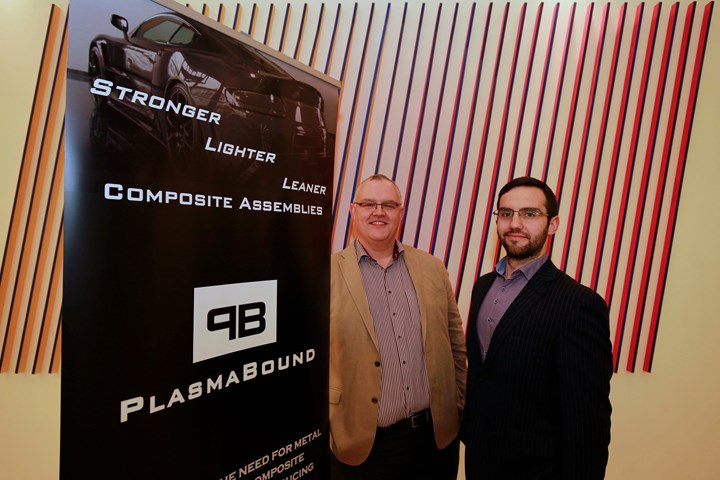PlasmaBound completes €1.1 million investment round
Ireland-based PlasmaBound has developed controlled polymer ablation (CPA) technology, which joins structural adhesives to composites materials.

Pictured at University College Dublin are PlasmaBound co-founders, Alan Barry, CEO (left) and James Nicholas Barry, technical director (right). Source | Nick Bradshaw, Fotonic
PlasmaBound (Dublin, Ireland) a University College Dublin (UCD) spin-off that focuses on lightweighting technologies, reported on June 24 that it has closed a €1.1 million investment round for the development of its surface treatment technology, controlled polymer ablation (CPA). The investment round was led by the Atlantic Bridge University Fund, with Enterprise Ireland and a number of private investors. Legal counsel was provided by Flynn O’Driscoll.
Said to enable global manufacturing industries to generate less manufacturing waste, reduce product weight and meet fuel efficiency and carbon emissions requirements, CPA uses a repeatable, high-speed one-step process to join structural adhesives to lightweight materials, namely carbon and glass fiber-reinforced composites. PlasmaBound says the technology enables global companies in the automotive, aerospace/space and wind turbine industries to achieve lightweighting goals with simplified and fully automated workstreams.
Alan Barry, CEO of PlasmaBound, notes the technology also reduces reliance on metal fasteners and reduces overall production costs with its inline operation. “Our technology took over 5-years to develop at UCD, so this announcement is a significant milestone for the company,” says Barry. “We are delighted to have closed this investment round, which will enable us to further develop our first-generation product offering and support PlasmaBound as we scale globally.”
PlasmaBound, headquartered at NovaUCD, the Centre for New Ventures and Entrepreneurs, was co-founded in 2017 by Dr. James Nicholas Barry, Alan Barry and Xavier Montibert as a spin-off from the UCD College of Engineering and Architecture (Dublin, Ireland), and following the completion of Enterprise Ireland Commercialisation Funding, a program meant to improve the competitiveness of the Irish economy through creation of technology-based start-up companies. Currently, PlasmaBound is an Enterprise Ireland High-Potential Start-Up, and was previously awarded €50,000 through the ESA Business Incubation Programme and secured an additional €40,000 through the ESA Technology Transfer Demonstrator Fund.
“I am very pleased to welcome PlasmaBound to the Atlantic Bridge University Fund portfolio. The company’s technology, which has the potential to support significant reduction in carbon emissions, is an excellent example of the world-class, commercially-focused research underway at UCD,” says Dr. Helen McBreen, investment director at Atlantic Bridge University Fund.
Related Content
-
Low-cost, efficient CFRP anisogrid lattice structures
CIRA uses patented parallel winding, dry fiber, silicone tooling and resin infusion to cut labor for lightweight, heavily loaded space applications.
-
Revisiting the OceanGate Titan disaster
A year has passed since the tragic loss of the Titan submersible that claimed the lives of five people. What lessons have been learned from the disaster?
-
Carbon fiber composite pallet revolutionizes freight industry
LOG Point Pallet fuses advanced materials with innovative design and manufacturing to improve supply chains worldwide.















